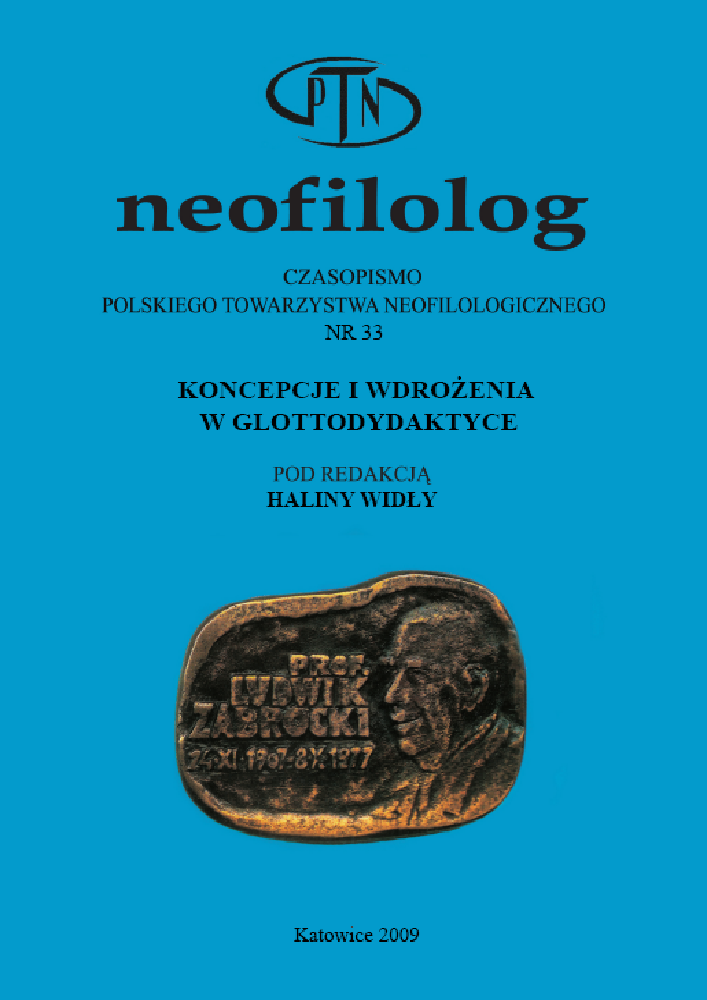Abstrakt
The aim of the paper is to explore the potential of two Internet tools for asynchronous communication, wiki and forum, in oral tasks oriented at the development of argumentative skills. I assume that the use of these tools while preparing an oral task may positively influence the quality of the reflection further developed during class discussion, that is that the work performed in the virtual community context can reinforce the processes of the co-construction of knowledge in oral interaction. The paper focuses on several qualitative changes in the teaching process which can be initiated by hybrid construction of class scenarios. I discuss also selected difficulties connected with the introduction of this didactic innovation and the principal advantages of such scenarios at the level of the didactic relationship and teaching objectives.
Bibliografia
Charlier, B., Deschryver, N. & Peraya, D. 2005. „Apprendre en presence et a distance – À la recherche des effets des dispositifs hybrides”. Distances et Savoirs4(4). 69 – 496.
Fountain, R. 2005. Wiki pedagogy. Dossiers technopédagogiques. http://profetic.org/dossiers/article.php3?id_article=969 DW: 30.09.09.
Giordan, A., G. de Vecchi. 1994. Les origines du savoir. Lausanne-Paris: Delachaux & Niestlé.
Hanna, B. A. & J. de Nooy. 2003. „A funny thing happened on the way to the forum: electronic discussion and foreign language learning”. Language Learning & Technology, 7 (1). 71-85. http://llt.msu.edu/vol7num1/hanna/default.html DW: 30.05.08.
Krajka J. 2007. English Language Teaching in the Internet-Assisted Environment. Issues in the use of the web as a teaching medium. Lublin: Maria Curie-Skłodowska University Press.
Nowicka, A. 2002. Sygnały dialogowe i działania argumentacyjne w dyskusjach osób uczących się języka angielskiego. Rozwijanie samodzielności komunikacyjnej poprzez negocjowanie. Nie opublikowana praca doktorska napisana w UAM w Poznaniu.
Orchowska, I. 2008. La formation interculturelle des futurs enseignants de FLE dans le contexte universitaire polonais. Kraków : FLAIR.
Licencja
Prawa autorskie (c) 2020 Joanna Górecka

Utwór dostępny jest na licencji Creative Commons Uznanie autorstwa – Bez utworów zależnych 4.0 Międzynarodowe.
Przedstawiany utwór (artykuł) upubliczniany jest na podstawie umowy z autorem i na licencji Creative Commons Attribution-NoDerivatives 4.0 International (CC BY-ND 4.0).
Użytkownicy mają obowiązek podania wraz z rozpowszechnionym utworem, informacji o autorstwie, tytule, źródle (odnośniki do oryginalnego utworu, DOI) oraz samej licencji;
- bez tworzenia utworów zależnych,
- utwór musi być zachowany w oryginalnej postaci.
Uniwersytet im. Adama Mickiewicza w Poznaniu zachowuje prawo do czasopisma jako całości (układ, forma graficzna, tytuł, projekt okładki, logo itp.).
